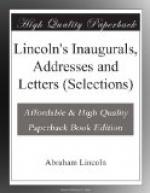LAST PUBLIC ADDRESS, APRIL 11, 1865
We meet this evening not in sorrow, but in gladness of heart. The evacuation of Petersburg and Richmond, and the surrender of the principal insurgent army, give hope of a righteous and speedy peace, whose joyous expression cannot be restrained. In the midst of this, however, He from whom all blessings now must not be forgotten. A call for a national thanksgiving is being prepared, and will be duly promulgated. Nor must those whose harder part give us the cause of rejoicing be overlooked. Their honors must not be parcelled out with others. I myself was near the front, and had the high pleasure of transmitting much of the good news to you; but no part of the honor for plan or execution is mine. To General Grant, his skilful officers and brave men, all belongs. The gallant navy stood ready, but was not in reach to take active part.
By these recent successes the reinauguration of the national authority—reconstruction—which has had a large share of thought from the first, is pressed much more closely upon our attention. It is fraught with great difficulty. Unlike a case of war between independent nations, there is no authorized organ for us to treat with. No one man has authority to give up the rebellion for any other man. We simply must begin with and mold from disorganized and discordant elements. Nor is it a small additional embarrassment that we, the loyal people, differ among ourselves as to the mode, manner, and measure of reconstruction.
As a general rule, I abstain from reading the reports of attacks upon myself, wishing not to be provoked by that to which I cannot properly offer an answer. In spite of this precaution, however, it comes to my knowledge that I am much censured for some supposed agency in setting up and seeking to sustain the new State Government of Louisiana. In this I have done just so much as, and no more than, the public knows. In the annual message of December, 1863, and in the accompanying proclamation, I presented a plan of reconstruction, as the phrase goes, which I promised, if adopted by any State, should be acceptable to and sustained by the executive government of the nation. I distinctly stated that this was not the only plan which might possibly be acceptable, and I also distinctly protested that the executive claimed no right to say when or whether members should be admitted to seats in Congress from such States. This plan was, in advance, submitted to the then Cabinet, and distinctly approved by every member of it. One of them suggested that I should then and in that connection apply the Emancipation Proclamation to the theretofore excepted parts of Virginia and Louisiana; that I should drop the suggestion about apprenticeship for freed people, and that I should omit the protest against my own power in regard to the admission of members to Congress. But even he approved every part and parcel of the plan which has since been employed or touched by the action of Louisiana.




